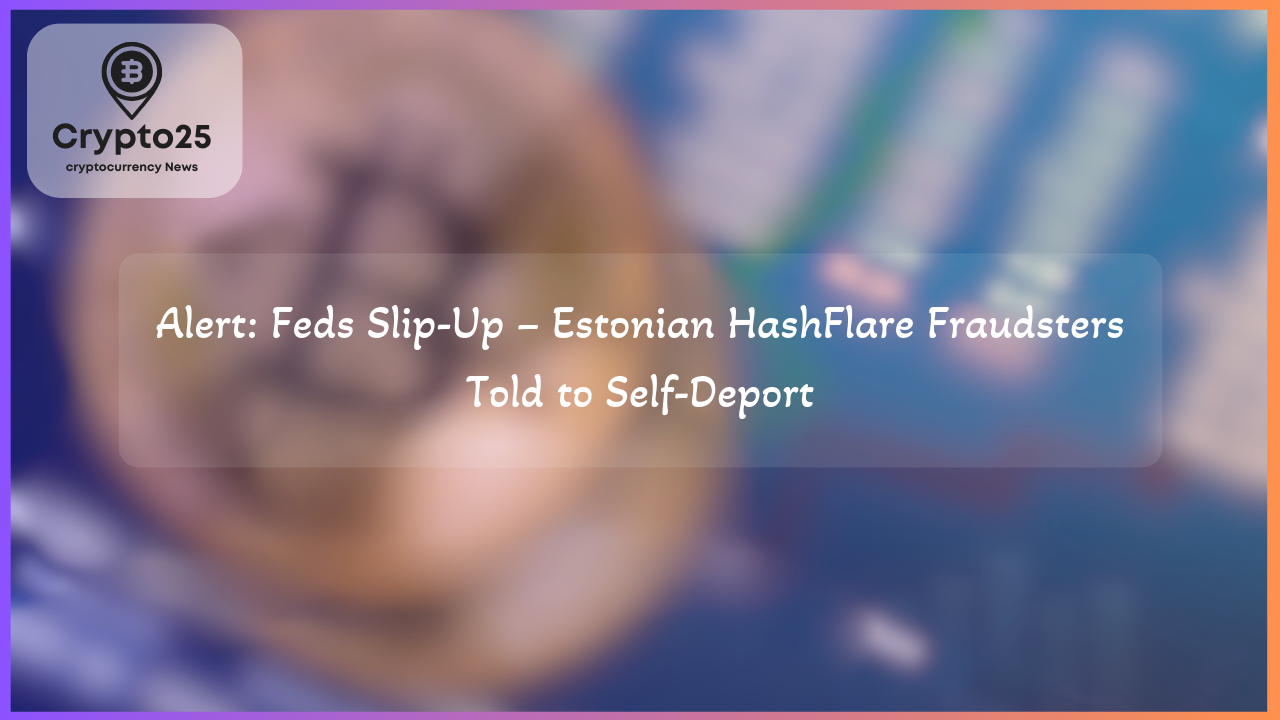
The HashFlare case has made headlines once again, but this time it’s for an unexpected twist involving immigration errors. Just months before their scheduled sentencing for orchestrating a $577 million crypto Ponzi scheme, the two Estonian founders of HashFlare were mistakenly ordered to self-deport by the U.S. Department of Homeland Security (DHS). This surprising development contradicts a court order requiring them to stay in Washington state until August.
## HashFlare Founders and Their Role in a $577M Cryptocurrency Ponzi Scheme
Sergei Potapenko and Ivan Turogin, co-founders of the now-infamous HashFlare platform, previously operated one of the largest crypto Ponzi schemes on record, deceiving investors worldwide. The scheme promised lucrative returns through cloud mining services but allegedly reallocated investor funds to luxury purchases and unrelated ventures. Extradited from Estonia in 2022 at the U.S. Department of Justice’s (DOJ) request, both men initially pleaded not guilty to an 18-count indictment but reversed their plea earlier this year. They admitted guilt to a conspiracy to commit wire fraud charge, which could result in up to 20 years in prison. As part of their plea deal, they also agreed to forfeit over $400 million in assets linked to the operation.
While the sentencing is scheduled for August 14, 2023, the recent bureaucratic misstep by DHS has introduced a new layer of complexity. Both men received unexpected emails instructing them to leave the United States immediately, threatening severe legal repercussions if they failed to comply. The emails, characteristically sent to undocumented immigrants or others under immigration scrutiny, raised alarms given their direct conflict with court-sanctioned requirements.
## DHS Immigrant Deportation Error Creates Tension in High-Profile Sentencing
The DHS communications, described as alarming by their legal counsel, have ignited concerns about broader immigration errors. With lines like, “It is time for you to leave the United States,” the emails not only caused confusion but also significant anxiety for Potapenko and Turogin, as stated in a joint letter to the court. Their attorney, Mark Bini of Reed Smith LLP, expressed unease over the possibility of wrongful intervention by immigration authorities, citing recent news reports of similar cases.
Interestingly, Potapenko and Turogin are not voluntary residents in the U.S. but were extradited to face trial. They complied with judicial orders and remained in the Seattle area on bond since mid-2022. Despite this, the threat of deportation, coupled with the prosecutorial consequences of non-compliance, created a legal conundrum, potentially jeopardizing their court proceedings.
Acknowledging the error, the DOJ intervened swiftly in collaboration with DHS’s Homeland Security Investigations (HSI). Their coordinated efforts led to a deferral of the deportation order for one year, ensuring the case’s timeline would remain unaffected. “This should provide ample time for the sentencing to take place,” the DOJ stated in a subsequent court filing. However, the incident underscores a critical issue of communication lapses between federal departments handling sensitive international criminal cases.
## The Future for Potapenko, Turogin, and the Crypto Community
The sentencing of Sergei Potapenko and Ivan Turogin is expected to set a precedent in how crypto-related fraud of this magnitude is addressed in legal systems globally. While their legal representatives are reportedly preparing to request time served as their sentence, prosecutors are unlikely to acquiesce to such a lenient outcome. The pair’s role in defrauding victims not only tarnished the reputation of the cryptocurrency sector but also highlighted the risks of unregulated platforms promising unrealistic returns during the industry’s earlier growth phases.
This case serves as a vital reminder for crypto investors worldwide. Conduct thorough due diligence before entrusting funds to any platform or service. The crypto ecosystem, while innovative, remains vulnerable to bad actors and schemes like HashFlare, which exploited market enthusiasm for financial gain. Enhanced regulatory measures, including greater oversight and transparency requirements, could help safeguard investors from falling victim to similar fraudulent schemes in the future.
| Title | Details |
|---|---|
| Market Cap Impact | $1.2 Trillion |
| Fraudulent Scheme Value | $577 Million |
| Assets Forfeited | $400 Million |
As the crypto world waits for the August sentencing, the HashFlare case continues to draw global attention, not just because of the unprecedented financial fraud but also due to governmental missteps involving the defendants. Both events reinforce the need for accurate compliance measures in handling criminal cases involving international defendants in rapidly evolving sectors like cryptocurrency. By holding individuals accountable and addressing systemic errors, jurisdictions can build a fairer and more resilient global financial framework.
